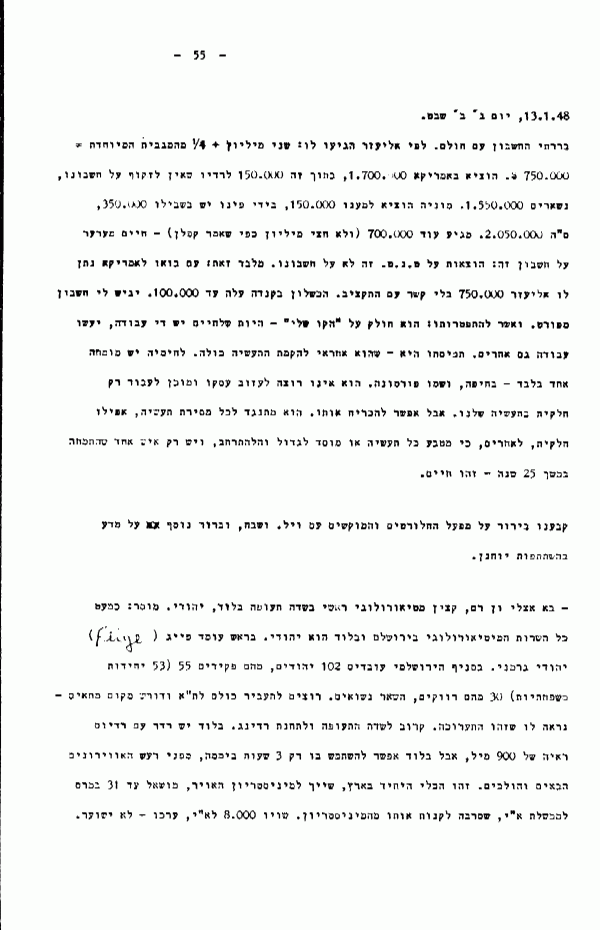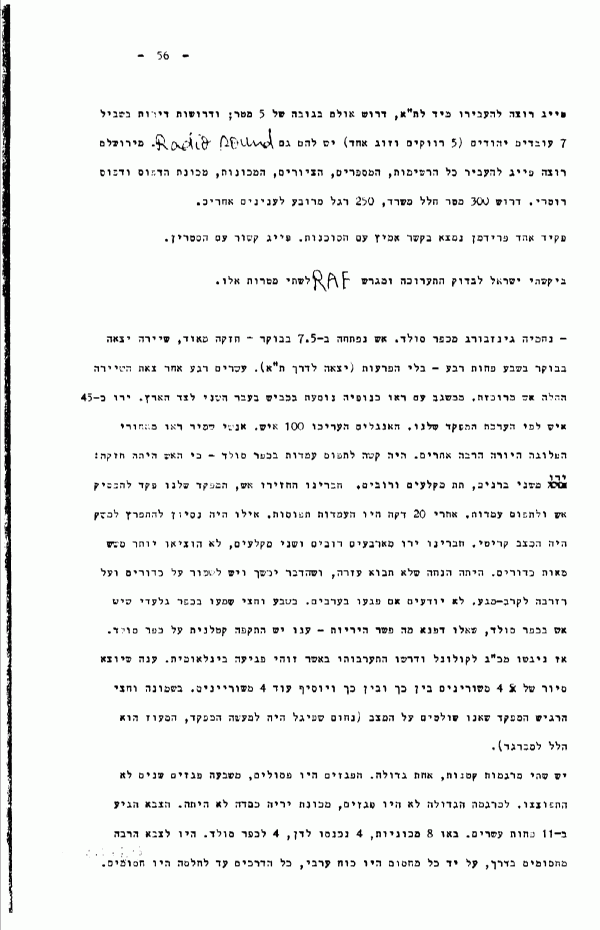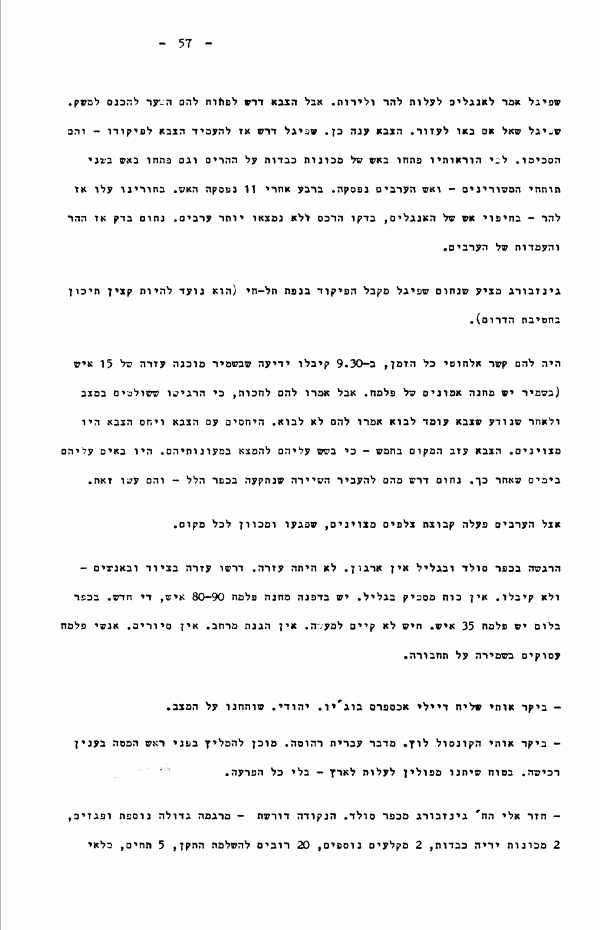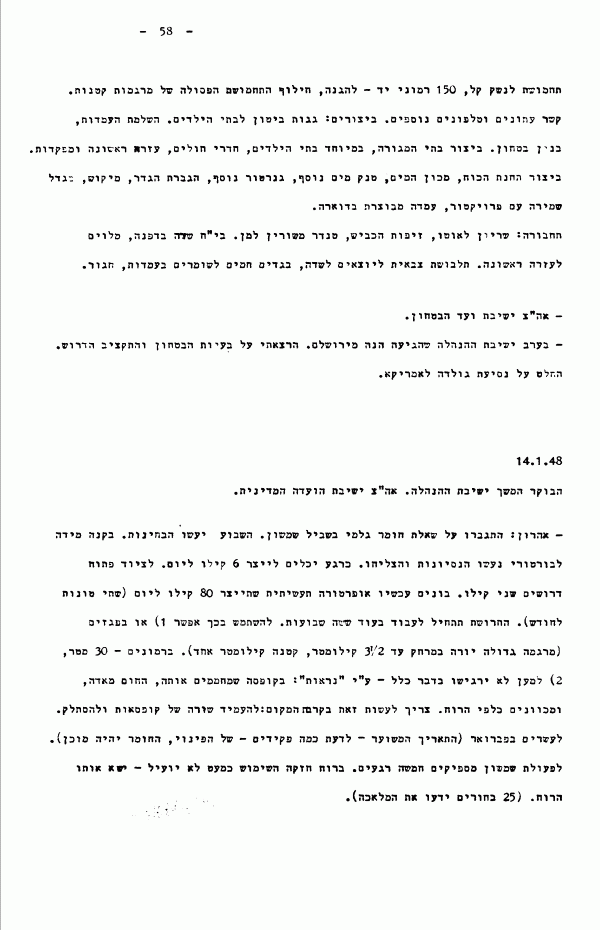1
of
Places:
Haifa
Canada
Jerusalem
Lod
Misgav Am
Shamir
Dafna
Dan
Kiryat Shmona
Tel Hai
Bet Hillel
The use of the photograph is subject to the Copyright Law, 2007
13.01.1948
224821
Tuesday, January 13, 1948 I discussed the accounting with Haim [Slavin]. According to Eliezer he was due: two million + ¼ from the special fundraising campaign = $ 750,000. In America he expended 1,700,000, of this 150,000 for radio that shouldn’t be charged to his account, which leaves 1,550,000. Munya took out 150,000 for him, Pino has 350,000 for him, in total 2,050,000. He’s due another 700,000 (not half a million as Kaplan says) – Haim disputes this accounting: expenditures on TNT are not from his funds. Aside from that: upon his arrival in America Eliezer gave him 750,000 independent of the budget. The fiasco in Canada cost up to 100,000. He’ll give me a detailed financial statement. As to his resignation: he disputes “my line” – because Haim [Slavin] has enough work, others should also be working. His outlook is – that he is responsible for establishing the entire industry. In chemistry there’s only one expert – in Haifa, and his name is Fortuna. He doesn’t want to leave his business and he’s prepared to work only part-time in our industry. But he can be forced. He opposes transferring any industry, even partially, to others, because it’s in the nature of every industry or institution to grow and expand, and there is only one man who specialized over the course of 25 years – and that’s Haim. We scheduled a discussion about the chlorites and mines industry with Vilenchuk and Shevah [Slavin] and another discussion about the Science [Corps] with the participation of Yohanan [Ratner]. – Van Ram [sp.], chief meteorological officer at the airport in Lod, came to see me. A Jew. [He] reports: nearly the entire meteorological service in Jerusalem and Lod is Jewish. At the head is Feige, a German Jew. The Jerusalem branch employs 102 Jews, of whom 55 are officials (53 family units) 30 of them single, the rest married. They want to transfer all of them to Tel Aviv and need a suitable place. He thinks this would be the exhibition [grounds] – near the [Sde Dov] airfield and Reading Power Station. In Lod there’s radar with a sight radius of 900 miles, but in Lod it can only be used 3 hours out of a 24-hour period, because of the noise of planes landing and taking off. This is the only device in the country, belongs to the Ministry of Aeronautics, on loan until March 31 to the Eretz-Israel [British Mandatory] government, which refused to buy it from the ministry. Its worth is P£ 8,000, its value – inestimable. Feige wants to transfer it immediately to Tel Aviv. It requires a venue with a height of 5 meters; and [we] need apartments for 7 Jewish employees (7 bachelors and one couple). They also have Radio Sound. From Jerusalem Feige wants to transfer all the lists, numbers, diagrams, machines, the printing and rotary printing machine. Requires 300 meters space for an office, 250 square feet for other matters. One official [of the meteorological service], Friedman, has close ties with the Agency. Feige is in contact with Hestrin. I asked Yisrael [Galili] to examine the exhibition [grounds] and R.A.F. field for both these purposes. – Nehemiah Ginzburg [sp.] of Kefar Szold: Gunfire began at 7:05 this morning – very intense. A convoy to Tel Aviv left at 6:45 in the morning – without disruptions. Twenty minutes after the convoy set out, concentrated gunfire began. From Misgav Am they saw a gang driving along the road on the other side [of the border] alongside the country. About 45 men were firing – according to our commander’s estimate. The English estimated 100 men. Shamir’s men saw many others behind the company that was firing. It was hard to take up positions in Kefar Szold – because the gunfire was intense: they were shooting from two Brens, submachine guns, and rifles. Our men returned fire. Our commander issued an order to stop firing and take up positions. It took 20 minutes to take up positions. If an attempt had been made to break into the settlement the situation would’ve been critical. Our men fired from forty rifles and two submachine guns, didn’t expend more than 600 bullets. The assumption was that help wouldn’t come, and it was necessary to preserve the bullets and keep a reserve for face-to-face combat. They don’t know if they hit the Arabs. At 7:30 they heard in Kefar Gil’adi that there was gunfire in Kefar Szold. They asked Dafna what the shooting was about – they answered: There’s a deadly attack on Kefar Szold. So [people] from Kefar Gil’adi approached the colonel [of the British armored battalion in Metulla] and demanded that he intervene because this was an international attack [cross-border gunfire]. He replied that a patrol of 4 armored vehicles was setting out in any event, and he would add another 4 armored vehicles. At 8:30 the commander felt that we’re in control of the situation (Nahum Spiegel [Golan] was actually the commander. The area commander is Hillel Lemberger [sp.]). There are two small mortars, one large one [in Kefar Szold]. The shells were duds; out of seven shells two didn’t explode. There were no shells for the large mortar. There was no heavy machine gun. The army arrived at 20 to 11. 8 vehicles came, 4 entered Dan, 4 [entered] Kefar Szold. The army had barricades along the way, with an Arab military presence next to every barricade. All the roads up to Khalisa [Kiryat Shmona] were blocked. Spiegel [Nahum Golan] told the English to go up the hill and open fire. But the army demanded that they open the gate to allow them to enter the settlement. Spiegel asked whether they came to help. The army answered: yes. Spiegel then demanded that the army be placed under his command – and they agreed. Under his orders they opened fire towards the hills with heavy machine guns and also opened fire with the two armored vehicles’ cannons – and the Arabs’ gunfire stopped. At 11:15 the gunfire ceased. Our men then went up the hill – under the cover of English firepower, checked the ridge, and didn’t find any more Arabs. Nahum then checked the hill and the Arabs’ positions. Ginzburg proposes that Nahum Spiegel assume command in the Tel Hai subdistrict (he’s slated to be planning officer in the southern brigade). They were in wireless contact the entire time; at 9:30 they received a message that there were 15 men ready to help in Shamir (there’s a Palmach training camp in Shamir). But [they] told them to wait because they felt they had control of the situation. After they learned that the army was coming, they told them not to come. Relations with the army and the army’s attitude were excellent. The army left the place at five – because at six they have to be in their lodgings. [Our men] came to see them in the days that followed. Nahum asked that they enable passage of the convoy that was stuck in Bet Hillel – and they did so. On the Arab side there was a group of excellent snipers who deliberately hit everywhere. The feeling in Kefar Szold is that there’s no organization in the Galilee. There was no help. They asked for help in the form of equipment and men – and didn’t receive it. There isn’t enough force in the Galilee. In Dafna there’s a Palmach camp of 80-90 men [who are] fairly new. In Kefar Blum there are 35 Palmach men. Hayish doesn’t actually exist. There’s no territorial defense. No patrols. The Palmach men are busy protecting transport. – A representative of the Daily Express, Boggio [sp.], a Jew, visited me. We discussed the situation. – The [Polish] consul Lotz [sp.] visited me. He speaks fluent Hebrew. He’s prepared to make a recommendation to the Polish chief of staff regarding procurement. He’s certain that they’ll allow ‘aliya from Poland – without any interference. – Comrade Ginzburg from Kefar Szold got back to me. The settlement needs: another large mortar and shells, heavy machine guns, 2 additional [light] machine guns, 20 rifles to meet the standard, 5 submachine guns, ammunition stockpiles for light weapons, 150 hand grenades – for defense. Replacing the dud ammunition for small mortars, “Avinoam” [wireless] signal, and additional telephones. Fortifications: concrete roofs for the children’s homes. Completion of the outposts, a security building. Fortification of the residences, especially the children’s homes, rooms for patients, first aid, and command centers. Fortification of the power station, the water facility; another water tank, another generator, reinforcement of the fence, laying of landmines, a watchtower with a projector [spotlight], a fortified outpost in Dawwara [facing the Arab village southeast of Kefar Szold]. Transport: armoring cars, paving the road, an armored pickup truck for MP [mobile patrol]. A field hospital in Dafna, escorts for first-aid [providers], military clothing for those going out to the field, warm clothes for guards at outposts, gear. – In the afternoon Defense Committee meeting. – In the evening a meeting of the [Jewish Agency] Executive, which came here from Jerusalem. I spoke about the defense problems and the necessary budget. It was decided that Golda would travel to America.












